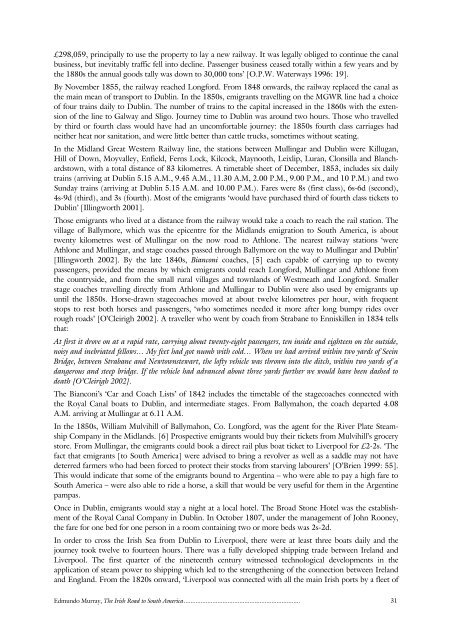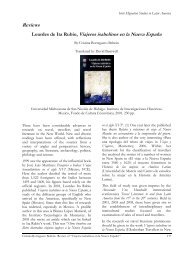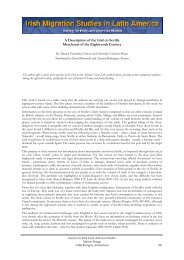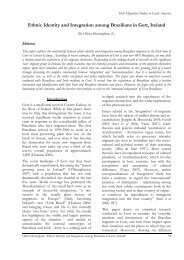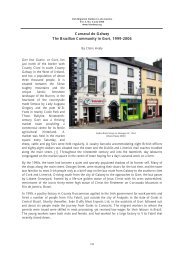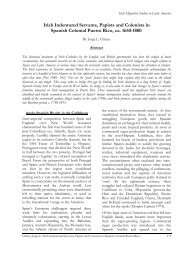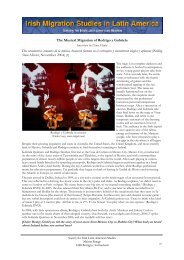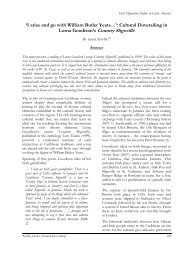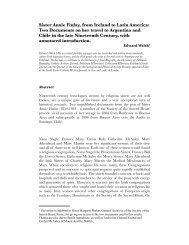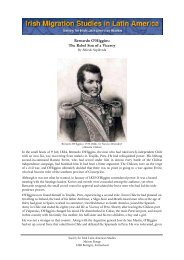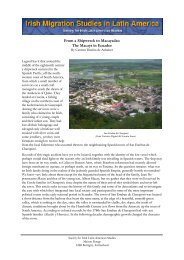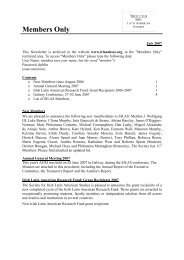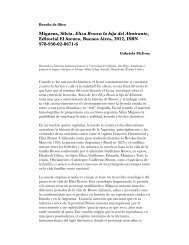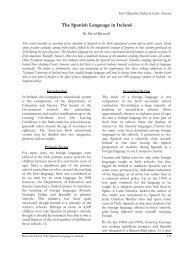I:6 Anti-dumping - Society for Irish Latin American Studies
I:6 Anti-dumping - Society for Irish Latin American Studies
I:6 Anti-dumping - Society for Irish Latin American Studies
You also want an ePaper? Increase the reach of your titles
YUMPU automatically turns print PDFs into web optimized ePapers that Google loves.
£298,059, principally to use the property to lay a new railway. It was legally obliged to continue the canal<br />
business, but inevitably traffic fell into decline. Passenger business ceased totally within a few years and by<br />
the 1880s the annual goods tally was down to 30,000 tons’ [O.P.W. Waterways 1996: 19].<br />
By November 1855, the railway reached Long<strong>for</strong>d. From 1848 onwards, the railway replaced the canal as<br />
the main mean of transport to Dublin. In the 1850s, emigrants travelling on the MGWR line had a choice<br />
of four trains daily to Dublin. The number of trains to the capital increased in the 1860s with the extension<br />
of the line to Galway and Sligo. Journey time to Dublin was around two hours. Those who travelled<br />
by third or fourth class would have had an uncom<strong>for</strong>table journey: the 1850s fourth class carriages had<br />
neither heat nor sanitation, and were little better than cattle trucks, sometimes without seating.<br />
In the Midland Great Western Railway line, the stations between Mullingar and Dublin were Killugan,<br />
Hill of Down, Moyvalley, Enfield, Ferns Lock, Kilcock, Maynooth, Leixlip, Luran, Clonsilla and Blanchardstown,<br />
with a total distance of 83 kilometres. A timetable sheet of December, 1853, includes six daily<br />
trains (arriving at Dublin 5.15 A.M., 9.45 A.M., 11.30 A.M, 2.00 P.M., 9.00 P.M., and 10 P.M.) and two<br />
Sunday trains (arriving at Dublin 5.15 A.M. and 10.00 P.M.). Fares were 8s (first class), 6s-6d (second),<br />
4s-9d (third), and 3s (fourth). Most of the emigrants ‘would have purchased third of fourth class tickets to<br />
Dublin’ [Illingworth 2001].<br />
Those emigrants who lived at a distance from the railway would take a coach to reach the rail station. The<br />
village of Ballymore, which was the epicentre <strong>for</strong> the Midlands emigration to South America, is about<br />
twenty kilometres west of Mullingar on the now road to Athlone. The nearest railway stations ‘were<br />
Athlone and Mullingar, and stage coaches passed through Ballymore on the way to Mullingar and Dublin’<br />
[Illingworth 2002]. By the late 1840s, Bianconi coaches, [5] each capable of carrying up to twenty<br />
passengers, provided the means by which emigrants could reach Long<strong>for</strong>d, Mullingar and Athlone from<br />
the countryside, and from the small rural villages and townlands of Westmeath and Long<strong>for</strong>d. Smaller<br />
stage coaches travelling directly from Athlone and Mullingar to Dublin were also used by emigrants up<br />
until the 1850s. Horse-drawn stagecoaches moved at about twelve kilometres per hour, with frequent<br />
stops to rest both horses and passengers, ‘who sometimes needed it more after long bumpy rides over<br />
rough roads’ [O’Cleirigh 2002]. A traveller who went by coach from Strabane to Enniskillen in 1834 tells<br />
that:<br />
At first it drove on at a rapid rate, carrying about twenty-eight passengers, ten inside and eighteen on the outside,<br />
noisy and inebriated fellows… My feet had got numb with cold… When we had arrived within two yards of Seein<br />
Bridge, between Strabane and Newtownstewart, the lofty vehicle was thrown into the ditch, within two yards of a<br />
dangerous and steep bridge. If the vehicle had advanced about three yards further we would have been dashed to<br />
death [O’Cleirigh 2002].<br />
The Bianconi’s ‘Car and Coach Lists’ of 1842 includes the timetable of the stagecoaches connected with<br />
the Royal Canal boats to Dublin, and intermediate stages. From Ballymahon, the coach departed 4.08<br />
A.M. arriving at Mullingar at 6.11 A.M.<br />
In the 1850s, William Mulvihill of Ballymahon, Co. Long<strong>for</strong>d, was the agent <strong>for</strong> the River Plate Steamship<br />
Company in the Midlands. [6] Prospective emigrants would buy their tickets from Mulvihill’s grocery<br />
store. From Mullingar, the emigrants could book a direct rail plus boat ticket to Liverpool <strong>for</strong> £2-2s. ‘The<br />
fact that emigrants [to South America] were advised to bring a revolver as well as a saddle may not have<br />
deterred farmers who had been <strong>for</strong>ced to protect their stocks from starving labourers’ [O’Brien 1999: 55].<br />
This would indicate that some of the emigrants bound to Argentina – who were able to pay a high fare to<br />
South America – were also able to ride a horse, a skill that would be very useful <strong>for</strong> them in the Argentine<br />
pampas.<br />
Once in Dublin, emigrants would stay a night at a local hotel. The Broad Stone Hotel was the establishment<br />
of the Royal Canal Company in Dublin. In October 1807, under the management of John Rooney,<br />
the fare <strong>for</strong> one bed <strong>for</strong> one person in a room containing two or more beds was 2s-2d.<br />
In order to cross the <strong>Irish</strong> Sea from Dublin to Liverpool, there were at least three boats daily and the<br />
journey took twelve to fourteen hours. There was a fully developed shipping trade between Ireland and<br />
Liverpool. The first quarter of the nineteenth century witnessed technological developments in the<br />
application of steam power to shipping which led to the strengthening of the connection between Ireland<br />
and England. From the 1820s onward, ‘Liverpool was connected with all the main <strong>Irish</strong> ports by a fleet of<br />
Edmundo Murray, The <strong>Irish</strong> Road to South America..................................................................... 31


